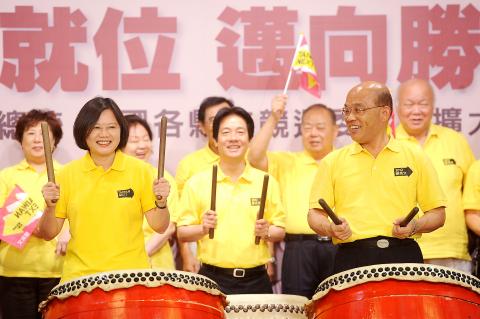Democratic Progressive Party (DPP) officials were in an exuberant mood at the party’s first national campaign meeting yesterday as Chairperson Tsai Ing-wen (蔡英文) said social issues, in particular income inequality, would be the central pitch of her presidential campaign.
“Today, Taiwanese society is calling on us again,” Tsai told hundreds of campaign officials at the meeting, saying that not only have the underprivileged suffered under President Ma Ying-jeou’s (馬英九) administration in the past three-and-a-half years, but the middle class has also been plagued by stagnant wages, high unemployment and poor industrial competitiveness.
In a nutshell, she said, most people are under the threat of poverty and income inequality.

Photo: Liu Hsin-de, Taipei Times
She proposed tax reforms that would make capital gains tax — rather than income tax — the major source of government revenue. The first step would be reforms to the real-estate transaction tax to stop property speculation, she said.
The DPP would also make good governance a central issue of the campaign, which Tsai said would be crucial to sustaining Taiwan’s democratic way of life, maintaining social justice and creating a sustainable environment.
The DPP always prides itself as being the party that “stands by the people,” she said, and despite the setbacks of the past few years, that spirit has never changed.
While the absence of former vice president Annette Lu (呂秀蓮), who is abroad, and DPP caucus whip Ker Chien-ming (柯建銘) raised some eyebrows, DPP officials looked confident after a two-hour discussion of the details of the campaign, from strategy to the division of labor.
They were briefed on a national opinion poll that showed that Tsai is leading Ma by a slim margin and the DPP gaining ground in northern and central Taiwan, which have traditionally been Chinese Nationalist Party (KMT) strongholds.
The DPP was satisfied with the progress and tempo of the campaign, said Lin Hsi-yao (林錫耀), a senior aide in Tsai’s office who is in charge of campaign operations.
The major task before the party’s national campaign headquarters is set up in Banciao (板橋), New Taipei City (新北市), in October will be grassroots-level organizational work in civic organizations, the private sector and religious groups, Lin said.
The campaign office will unveil its second campaign slogan, following the “Taiwan NEXT” slogan, very soon and it will highlight the poverty issue, he said.
Tsai shared the podium with former premiers Su Tseng-chang (蘇貞昌), Frank Hsieh (謝長廷) and Yu Shyi-kun, all of whom are expected to play important roles in the campaign, as well as other prominent party members.
As campaign chairman — more a symbolic position than a functional one — Su would be able to help Tsai a great deal by simply voicing his support, Lin said.
Hsieh will be in charge of mobilization and Internet campaigning, while Yu will be the campaign’s finance officer, he said.

STILL COMMITTED: The US opposes any forced change to the ‘status quo’ in the Strait, but also does not seek conflict, US Secretary of State Marco Rubio said US President Donald Trump’s administration released US$5.3 billion in previously frozen foreign aid, including US$870 million in security exemptions for programs in Taiwan, a list of exemptions reviewed by Reuters showed. Trump ordered a 90-day pause on foreign aid shortly after taking office on Jan. 20, halting funding for everything from programs that fight starvation and deadly diseases to providing shelters for millions of displaced people across the globe. US Secretary of State Marco Rubio, who has said that all foreign assistance must align with Trump’s “America First” priorities, issued waivers late last month on military aid to Israel and Egypt, the

France’s nuclear-powered aircraft carrier and accompanying warships were in the Philippines yesterday after holding combat drills with Philippine forces in the disputed South China Sea in a show of firepower that would likely antagonize China. The Charles de Gaulle on Friday docked at Subic Bay, a former US naval base northwest of Manila, for a break after more than two months of deployment in the Indo-Pacific region. The French carrier engaged with security allies for contingency readiness and to promote regional security, including with Philippine forces, navy ships and fighter jets. They held anti-submarine warfare drills and aerial combat training on Friday in

COMBAT READINESS: The military is reviewing weaponry, personnel resources, and mobilization and recovery forces to adjust defense strategies, the defense minister said The military has released a photograph of Minister of National Defense Wellington Koo (顧立雄) appearing to sit beside a US general during the annual Han Kuang military exercises on Friday last week in a historic first. In the photo, Koo, who was presiding over the drills with high-level officers, appears to be sitting next to US Marine Corps Major General Jay Bargeron, the director of strategic planning and policy of the US Indo-Pacific Command, although only Bargeron’s name tag is visible in the seat as “J5 Maj General.” It is the first time the military has released a photo of an active

CHANGE OF MIND: The Chinese crew at first showed a willingness to cooperate, but later regretted that when the ship arrived at the port and refused to enter Togolese Republic-registered Chinese freighter Hong Tai (宏泰號) and its crew have been detained on suspicion of deliberately damaging a submarine cable connecting Taiwan proper and Penghu County, the Coast Guard Administration said in a statement yesterday. The case would be subject to a “national security-level investigation” by the Tainan District Prosecutors’ Office, it added. The administration said that it had been monitoring the ship since 7:10pm on Saturday when it appeared to be loitering in waters about 6 nautical miles (11km) northwest of Tainan’s Chiang Chun Fishing Port, adding that the ship’s location was about 0.5 nautical miles north of the No.